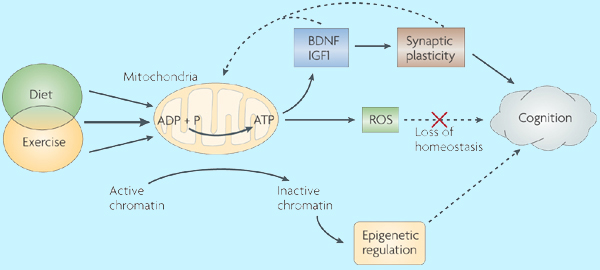|
In the past,
the effects of diet and exercise have been associated exclusively with
bodily systems, yet ongoing research at
UCLA NeuroLife Lab
reveals that these lifestyle
factors are also multifarious and long-lasting modifiers of mental
health and cognition. Emerging developments in the
field of neurobiology indicate that the causes of many cognitive
and psychological disorders lie within environmental factors such as the poor
management of lifestyle habits. If a proper relationship between our brain and
our surroundings is not maintained, we can become vulnerable to the
influence of an array of CNS-associated challenges and illnesses.
Thus, the proper management of lifestyle
habits can arm us with the brainpower necessary to fortify cognitive
reserve and battle various brain and spinal cord diseases.
So
far, we have found that dietary and exercise factors can affect the CNS
through a broad spectrum of molecular and cellular impressions, varying
from effects on energy homeostasis to modifications of signaling pathways
involved with synaptic plasticity. However, these discoveries are just the
tip of the iceberg and a large body of work remains to be explored in this
field. Currently, we are studying the effects of dietary and exercise
factors on mechanisms of the plasma membrane, the immune system, and
epigenetics as determinants of neural health. Further research on this
integrative network of lifestyle influences on the brain and spinal cord
would establish the exciting possibility of developing a natural,
non-invasive, and cost-effective therapeutic solution against a
long-standing global dilemma. Because of its implications to solve global
problems of nutrition and mental health, these pursuits have surpassed the
need for expensive and invasive treatment and instead offer a plea of
natural and affordable simplicity in turning the most basic aspects of
life - feeding and movement - into treatment itself.
|

This graphic depicts a brain built from healthy
foods: the cognitive-related cerebral cortex is made of spinach while the
memory-related hippocampus is made of seafood. (The Economist,
2008)
__________________________
Contact
Information:
UCLA NeuroLife
Lab
(neurolifelab@gmail.com)
Fernando Gomez-Pinilla, Ph.D. (fgomezpi@mednet.ucla.edu)
|





